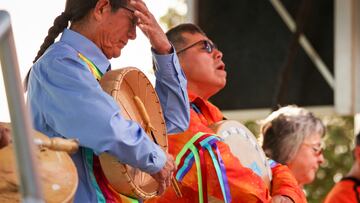Columbus Day and Indigenous Peoples’ Day: History and Controversy
The White House has made two proclamations for holidays that will take place on Monday, 9 October: Columbus Day and Indigenous People’s Day.

Once again, the White House has released two proclamations to announce that on Monday, 9 October, the country will celebrate both Indigenous People’s Day and Colombus Day. For the third year in a row, the White House has attempted to appease both sides of the conflict by deciding to celebrate both holidays, which, for some, undermines the importance of recognizing the violence experienced by Indigenous people, both in the past and presently.
The conflict between Columbus Day and Indigenous People’s Day stems from the fact that Christopher Columbus was one of the first colonizers to reach North America. The expeditions funded by the Spanish monarchy led to one of the largest and most horrific genocides in human history. Native people who for centuries had lived in what is now North and South America saw their populations obliterated by the intentional spreading of smallpox and the violent subjugation inflicted by European colonial settlers.
When did Columbus Day become a national holiday?
When immigrants from Italy began coming to the United States, many experienced racial discrimination, which made accessing employment, housing, and educational opportunities more difficult.
These racist beliefs often led to outbreaks of violence, and in 1982, eleven Italian immigrants were lynched in New Orleans, Louisana. Later, during World War II, immigrants of Italian descent and their children were seen as traitors and, while subjected to far less state violence than Japanese-American communities, still experienced an uptick in discrimination.
Following this history of discrimination, the federal government established Colombus Day, beginning in 1968, to honor the contributions of Italian-American communities. This sentiment comes through in the White House’s statement proclaiming October 9th as Colombus Day, which reads that the holiday “celebrate[s] all the Italian Americans, whose courage and character reflect and help define our Nation.”
Christopher Columbus was taken as the main figure to be celebrated because of his Genoan heritage, but it is critical to mention that Italy, in the sense that we understand the country today, did not exist in Columbus’ time. The unification of northern and southern Italy did not even take place until 1848.
Calls for Indigenous People’s Day grows
The White House’s proclamation marking the celebration of Indigenous People’s Day reads that on 9 October, the country will “honor the perseverance and courage of Indigenous peoples, show our gratitude for the myriad contributions they have made to our world, and renew our commitment to respect Tribal sovereignty and self-determination.”
Tribal nations and organizations that represent their interests have called for the US to drop Colombus Day in favor of a day that recognizes the struggle indigenous people faced since colonizers landed on this side of the Atlantic.
The Lakota People’s Law Project, an organization that fights for the rights of the Lakota People, posted on X, “It’s 2023, 531 years since Colobus’ arrival and there are still 22 states that celebrate the “discovery of America” by Christopher Columbus. This false narrative must stop.”
The subjugation of indigenous communities, which continues in different forms, is a history the federal government has not taken active steps to reconcile. A holiday that focuses on the unique contributions and the painful history of indigenous people is one step forward in the long process that would be historical reconciliation.






